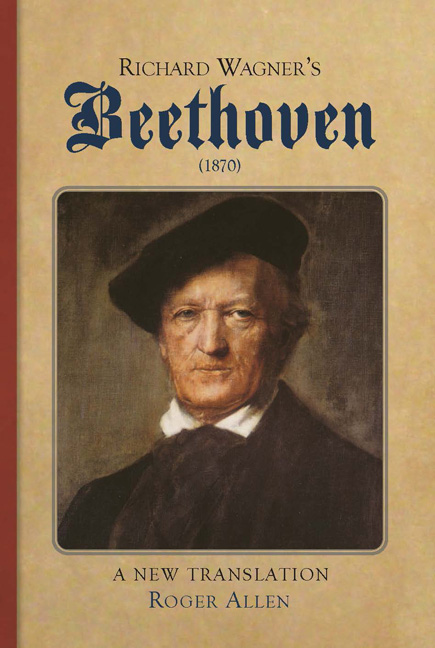Book contents
Appendix: ‘Beethoven u[nd] d[ie] deutsche Nation’ (German text)
Published online by Cambridge University Press: 05 November 2014
Summary
[zwischen 3. und 19. Juli 1870]
Beethoven u[nd] d[ie] deutsche Nation
Welches Verhältniss? – doch nur zum deutschen Geiste? Wie verhält sich dieser zur ‘Schönheit?’ – Begriff der Schönheit – dem Griechischen Geiste eigen; diesem als Begriff entnommen. Der Bildenden Kunst einzig zu eigen. Der Poesie insofern, als sie von Vorstellungen sich nährt, welche der bildenden Kunst zufallen: die wesentlichsten Ingredienzen der Poesie entstammen aber der Musik. In wiefern ist Musik schön?
Nähere Untersuchung. Ausgangspunkt Sch: W. als W.u. V. II. 415. Der dunkle Hintergrund im Bewusstsein für die Idee. Hierzu: 418. Unterschied in dem nach aussen u. dem nach gekehrten Bewusstsein.
Dieses zweite ist das, aus welchem der Musiker schafft. Grosse Verschiedenheit, Traumtheorie. (Tagseite – Göthe. Nachtseite – Beethoven.) Traumdeutung. Musik das unmittelbare Traumbild. Die innerste Kraft, aus der unsre Dichter sich unbewusst ernährten, welche sie ahnten und zu erklären suchten. In Beethoven unmittelbar schaffend. Nach welchen Gestzen? Eigener Schrei –äusserer Schall. Indiv: – Natur. Plastik nur als unmittelbarer Lebensakt i. Tanz. Volksleid. – Weiter – Ideale Realität. – (Franzosen – Italiener.)
Confusion im Erfassen der Musik. Unklarheit u. Geschmacklösigkeit. Selbstverkennen. Die Bildner u. Dichter geben der Nation was sie scheinen möchte, der Musiker was sie in Wahrheit ist. Der Schrecken über die innere Welt Grund des Erhabenen. Erhabenheit. Die Wirkung der Musik ist immer die des Erhabenen: ihre Form aber die der Schönheit, d.i. zunächst Befreiung des Individuum's von der Vorstellung jeder Causalität. Die Musikalische Schönheit ist die Form, in welcher der Musiker mit dem Erhabenen spielt.
- Type
- Chapter
- Information
- Richard Wagner's Beethoven (1870)A New Translation, pp. 201 - 202Publisher: Boydell & BrewerPrint publication year: 2014



